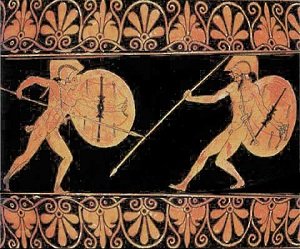 In order to sum up the role or gods in the eternal masterpiece written by Homer, one may use the bright remark of the character of Shakespeare’s “King Lear”, which is the following “As flies to wanton boys are we to the gods; / they kill us for their sport”. This is the holy truth but only to a certain extent for the reason that the gods in “The Iliad” have solid connections with some of the mortal people (remember the special friendship between Odysseus and Athena?), especially when these people are their kids (consider Thetis and her grief for her son Achilleus). But at the same time, there is still something trivial about “The Iliad” gods and the way of life they keep to. It is made clear in the Book 1 feasting scene, in contrast to the intense struggle between mortals (Agamemnon and Achilleus).
In order to sum up the role or gods in the eternal masterpiece written by Homer, one may use the bright remark of the character of Shakespeare’s “King Lear”, which is the following “As flies to wanton boys are we to the gods; / they kill us for their sport”. This is the holy truth but only to a certain extent for the reason that the gods in “The Iliad” have solid connections with some of the mortal people (remember the special friendship between Odysseus and Athena?), especially when these people are their kids (consider Thetis and her grief for her son Achilleus). But at the same time, there is still something trivial about “The Iliad” gods and the way of life they keep to. It is made clear in the Book 1 feasting scene, in contrast to the intense struggle between mortals (Agamemnon and Achilleus).
When reading about the gods pictured by Homer, one should remember several basic facts. First, they are all immortal creatures. In other words, their veins have no blood. They are full of ichor – the divine matter. To say more, they can live without food, giving preference to ambrosia and immortal nectar. At some point Homer’s gods even “eat”. But having no McDonalds nearby, they are satisfied with the sacrifice smoke coming from the burned animal fat, offered by mere mortals. In exchange for such offerings from people, the gods are ready to provide a lot of services for human beings (for instance, giving the desired victory in the athletic contests).
One more thing to remember about the gods created by Homer is that they took the great Trojan War rather personally. Athena, the goddess of wisdom and war, and Hera, the goddess of females, are against the Trojans for the silliest reason – because Paris found Aphrodite more gorgeous than them. The lord of the sea, great Poseidon is also opposed to Trojans because he is mad at Laomedon. An ancient Troy king enslaved him long time ago. Ares, the god of war, has taken the Trojans side. In other words, everyone has made his own choice.
As for those, who are neutral, the king of all gods Zeus, the lord of the metal-working Hephaistos and finally the underworld kind Hades – all of them pick their sides depending on the occasion, for their own profit.
The final aspect you should keep in mind when reading “The Iliad” by Homer is that even though these heavenly creatures are not bound by destiny, they still have to resign themselves to it anyway, just in order to keep the life of mere mortals in strict order.
This was an example of the Iliad essay, written by the experts of our essay writing company. To buy an essay on the necessary topic, please, fill in the Free Inquiry form in the top right corner of this page.